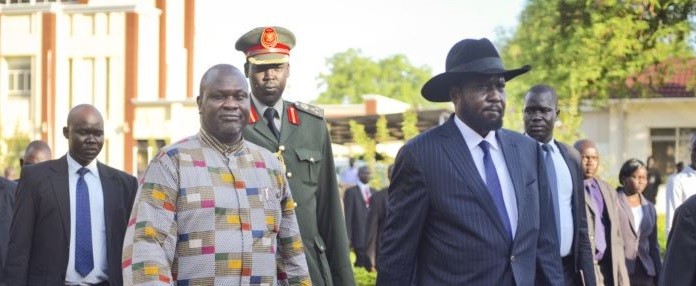President Salva Kiir and First Vice President Riek Machar have jointly announced their opposition to implementation of Chapter 5, Article 3 of the Agreement on the Resolution of the Conflict in South Sudan, which mandates the establishment of a Hybrid Court to try war criminals, according to an opinion article attributed to them published by The New York Times.
The hybrid court would include both South Sudanese and African justice chosen by the African Union and would have authority to try crimes of genocide, crimes against humanity, war crimes and crimes of sexual violence, according to the peace deal.
South Sudan’s peace deal says the Hybrid Court must be independent from South Sudan’s supreme court and it will carry out its own investigations. It also says that the decisions of the hybrid court may not be overturned by any of the national courts of South Sudan.
But the two leaders Machar and Kiir say that they do not want the court, according to an opinion article allegedly penned by the two men and published in The New York Times on Tuesday, the politicians said that South Sudan “needs truth, not trials.”
—
UPDATE/CORRECTION, 10 JUNE 2016: The New York Times has confirmed to us that they did not authenticate Machar’s authorship of the article prior to publication. Kiir’s office confirms their role and says Machar also agreed to publication of the article, but Machar’s office denies that he had any hand in the article. Relevant parts of this text have been changed to indicate that the authorship of the article is disputed.
—
The op-ed proposed instead that the Commission for Truth, Reconciliation and Healing (CTRH), which is also established by the same peace deal, should grant amnesty from prosecution to “those who tell the truth about what they saw or did… even if they did not express remorse.”
Kiir in the article says that a hybrid court “would destabilize efforts to unite our nation by keeping alive anger and hatred among the people of South Sudan.”
“We fear that this task could be put in jeopardy if members of once opposing forces — from officers to privates — find themselves targeted with legal action. It is easy to see how some people, having known nothing but war, may prefer to return to the battlefield than stand trial in a foreign country,” reads the op-ed.
Meanwhile, the United Nations secretary-general has offered support to the African Union to help set up the hybrid court. Also, the UN Panel of Experts earlier this year named Machar and Kiir as people who fueled the war in South Sudan, saying they should be subject to a travel ban and asset freezes.
In their report, the UN Panel of Experts also said that Kiir bears “command responsibility” for forces that allegedly attacked civilians in Juba, Unity State and elsewhere. Similarly, the African Union Commission of Inquiry has concluded that killings of unarmed Nuer civilians in Juba in December 2013 were carried out “pursuant to or in furtherance of a State policy.”
In response to the UN Experts’ report, South Sudan’s Minister of Information Michael Makuei has accused the UN of trying to carry out “regime change.”
The Hybrid Court mandated by the peace agreement has not yet been established. The peace deal gives the chairperson of the Commission of the AU the power to decide the seat of the court.
The peace deal says, “No one shall be exempted from criminal responsibility on account of their official capacity as a government official.”




